#who is unreliable due to the fact that they can't even rely on their own brain
Text
i really really wanna write a story at some point that starts out as one of those cliche YA novels where a normal human character finds out about an entire magic world they didn't know about- except the character is some form of mentally ill with paranoia and delusions, so the story revolves around how much more difficult it becomes for this person to percieve the world while also dealing with whatever Magic Bullshit is being thrown at them
#cw unreality#tw unreality#<- just for the description of some of the delusions#i don't want to trigger someone else to have a bad delusion/paranoia because of my own paranoias + creative writing ideas#but like the story is told by this unreliable narrator#who is unreliable due to the fact that they can't even rely on their own brain#and the struggle is figuring out what's real and what's reliable#but because of the character's history with their mental illness they can't do it on their own#but suddenly don't know if they can trust literally anyone else around them because- what if it's all just lies#but then also are stuck in a place of semi-denial where they desperately want to believe this isn't real and is just another delusion#so the story focuses on them learning to manage their symptoms enough to get a hold on what's happening#while both you and the main character struggle to figure out what's actually happening in the story#a semi-mystery type thing#idk just. as a person with delusions and paranoia#if something like that happened to me i would *freak the fuck out*#like on one hand i've been begging to get isekai'd into a fantasy world my whole life#on the other hand i would have absolutely no way to tell whether or not it was just a bad mental break#because the worse your symptoms get the harder perception becomes#to where i don't know if i'd be able to trust literally any of my senses because well. i get pretty vivid tactile hallucinations#i wouldn't be able to reach out and touch the magic creature in front of me and immediately know it was real#it could just be my brain supplying the sensation because i expected it and my own brain is crafting a false world around me#and as a writer just. thinking about that kind of fucked up situation makes me a little rabid#i like to fuck up my characters. lots#and fucked up situations based on my own delusions/paranoias? fun content fun content
0 notes
Text
Father’s “reality”
I wanted to talk about something I was thinking about about Father's reality there is a lot of symbolism in that place that correlates to how Father sees things. The reality that Father created is how Father actually sees things it reflects how he perceives the world. The reality that Father created is based on his cognition and this extends to both Yato and Nora.
Nora's form in that place is that of a worm and a snake referencing her name mizuchi a water snake I think the form notes to the form she showed to Hiyori and the fact that she is a dumpster baby abandoned by the river, This could reference to how the worm form that mizuchi has is how he views he looking down on her as he did with everyone else such as assuming this is peoples true forms when in reality this is his own preconception.
Yato’s form is that of a child this is self-explanatory because the father always viewed Yato as a disobedient child who follows his orders rather than Yato as his own person this is evident in how he refers to Yato as yaboku instead of Yato. The form Yato takes his father's own version of him.
This is the embodiment of what the father perceives them in reality.
Father's human form is how he looked in death and the blood pouring from his neck references his beheading. The reason he has a human form is because he is worshiped as a god.
The house in reality is the same house that Yato, him, and Nora live in.
Father is actually very hypocritical, for example, despite hating gods he is one his whole talk on how gods get away for their mistakes without receiving punishment due to the willingness of their worshipers and their followers are compliant mirrors to how father gets away with crimes and isn’t punished and has one follower that allows him to do what he pleased. This, in turn, makes Father arrogant in that He sees himself as the necessary evil when he is battling Amaterasu but forgets that concepts like good and evil don’t exist with gods this is based on human perception, and Father this makes that is no different than a human Despite hating humans he displays behaviors of them with. the reality as a reference to it the reality that Yato and Nora are trapped in is awfully self-centered and egotistical pretty human.
the way father lashes out at Nora and Yato when he gets angry is kin to a child throwing a temper tantrum and to put it bluntly “he's nothing but an overgrown brat who has fun bringing trouble to those around him and can't stand when things don't go his way.”. that that father is just really an egotistical manchild that makes him similar to yato. like yato, Father relies heavily on lifelines to keep himself alive if you think about it Father was killed and then brought back he didn’t escape the underworld on his own if father stayed in the underworld any longer he would have been devoured by Izanamis servants it was the help of kaya and the others that brought him back.
Father is someone who always viewed that needed help like with kaya, his two lifelines He relies on the lives of others to sustain himself. He doesn’t do anything on his own without the help of others
Yato is not the only one who needs his father, his father needs him to enact his plans he uses others because he cannot do anything himself but unlike his father yato chooses to sacrifice himself over his own selfish self-preservation.
Father is an unreliable narrator even his view shifts and distorts depending on his surroundings this is evident in the flashbacks and his failure to recognize his personal wrongdoings.
the part when he creates his own nation and expands in the world of the living is him imposing his reality on others with no regard to their wills it's pretty clear that Father doesn’t care about anything except himself.
Sorry if I end up ranting about him and losing the subject there is so much to talk about him and I was wondering if anyone
16 notes
·
View notes
Text
Ethics and morality... and how they're not the same...
Weird title, and I don't even know if I'll properly approach this one with all the topics I wish to this discuss in today's The Devil Judge essay, because a lot of things peaked my interest, I was debating on doing a separate post for each subject, but I'll do them all in here:
Starting simple
I know we're only 4 episodes in, but I want to break down the things that I often look for in a new show:
Cinematography
Soundtrack
Character building
Plot devices
Social commentary (sometimes)
Of course, these are things most people would consider basics, but I find that a lot of TV shows don't have enough balance in them. Also, cinematography and soundtrack are pretty up there for me because when a plot gets slow, or something like that, I stay for those two (biggest example: King Eternal Monarch).
The soundtrack in The Devil Judge is amazing and the cinematography can be a character of its own. They really get me hooked and are used as tools to properly tell a story. And I'll get into that further down this post.
The onlooker will never understand the actor
Experience is your best friend not only applies to job hunting, but it's true in the real world too. You can't truly weigh in on something unless you've experienced it yourself, you can give it your judgment and everything, but when bad things happen to someone, you'll never truly understand their pain. Am I bringing up because of the difference of mind in Judge Kang and Judge Kim's opinions? On how the public treated the minister's son? No. I'm talking about a very specific scene, where the cinematography told me to think that way and not the dialogue (it's that easy for my mind to be swayed). In episode 3, when the rich are about to dine right after the foundation's commercial for a better future, we see this aerial shot:
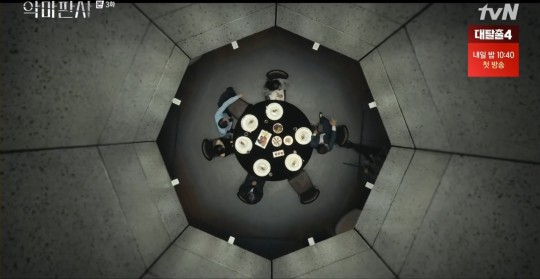
What's interesting about this? The seclusion and the enclosed feeling it conveys as a counterpart to the poverty shots we were just shown. Yet, these are the people making ads for a better future, what do they know?
They live comfortably behind concrete walls with no windows to see what goes on apart from the bubble they live in. This idea is further enforced at the party in episode 4, where they're not even a part of the donations, and watch and mock from afar as spectators. Yet, these people call the shots. They even call it commenting, as if they were watching the pain of others on TV.
The intriguing personality and the duality it encites
Now, this was a costume and wardrobe decision, but it was also very well thought of:
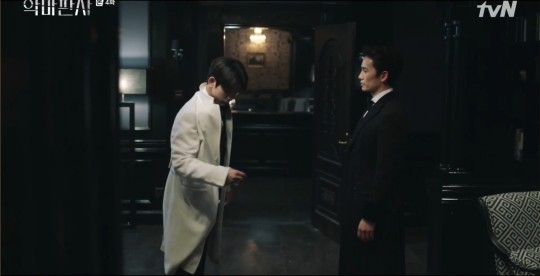
Judge Kim wears white and Judge Kang wears black. One is morally perceived by viewers of the show as morally good and the other is perceived as morally dubious at best. However, besides the costume and wardrobe thought put into this, we also have to think about the delivery of this scene and how it may further affect my detailing of this section. Judge Kang brings down the coats, and hangs over the coat to Judge Kim, he's the one who is making that annotation: You're pure, I'm tainted. This can have one of two interpretations:
Either Judge Kang believes Judge Kim to be pure and innocent due to his status as a rookie in the field
Or he believes Judge Kim to be morally white and himself morally black as he's looking at his brother's face and not at Judge Kim's heart.
Because most of the back story we're unveiling is through Judge Kim's perception, there's also an inherit bias we're having as well, because in Judge Kim narrative, he believes he's doing what's right and believes Judge Kang to be evil. In being served information about Judge Kang through Judge Kim's eyes, our bias is inherently skewed.
Another thing is that, when they put on the coat, they're standing in front of the other, as if the producers of this series are telling us they're two sides of the same coin.
The duality is made in more deceitful ways, which include:
A difference of classes that implies one has suffered while the other has not.
A difference of experience that implies one is more tainted while the other is pure.
A difference of age that implies one is a sly fox while the other one is is bunny about to be eaten.
A difference of temper that makes one erratic and the other logical.
Power dynamics
This one, in this one I could make a whole thesis based on just a couple of scenes in the drama. And you know I have to mention it: director Jung being the puppeteer.
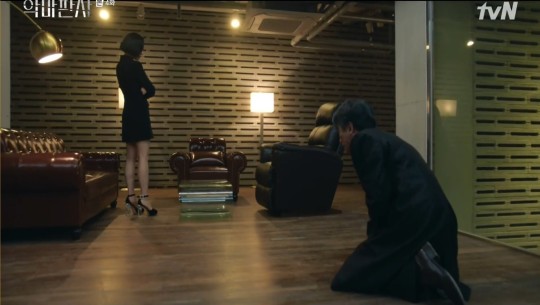
It may not be as unexpected at first, nevertheless it brings forward a lot of things I've wished to touch upon for quite some time now. A woman being a puppeteer of an old man in the portrayed dystopia that The Devil Judge is painting makes much more sense than more common demonstrations of these dynamics where it's either a:
A man of power being controlled by a bigger man of power.
A man of power being controlled by a seemingly man of a lower status.
A woman being controlled by a man of power.
Although, there's nothing wrong with those power dynamics, and if they were to be used, a message could also be conveyed, this one in particular works as a megaphone.
A subversion of power in such a way can be interpreted as a true indication of the weak overcoming the powerful. Why? It is not that woman are naturally weaker than men, but that in society, patriarchy has been a big factor in taking voice away from women in order to give it to men.
In order for Director Jung to achieve her purposes, it's smarter for her to do it under the pretense that an old rich man in power is the one calling the shots.
This is better exemplified by her stance when the old man tries to excuse his behavior, and what her moral compass is. I'm not saying I agree with her unethical conduct, but that her morality is directly impacted by the perception of the public of her as a weak woman:
Just because a dog bites a human does the person get dirty?
This is telling on how she perceives the actions of the old man in gropping the waitress. She didn't do anything wrong, even if you touched her, you are the dirty one.
While she's evil, it's a refreshing and deep evil.
The public's opinion and how there's actually logic in the show's portrayal
The public opinion can make or break a person, even if it's not on a public trial like this. While "cancel culture" barely works in today's society, a person's reputation is forever tainted. The show does tell that, but it also exhibits the scary downside of it, by showing how easily it was to make people accept flaggelation as a fitting punishment.
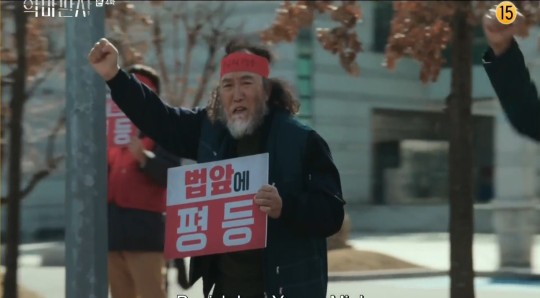
There are many experiments that have tried to test the effect of societal pressure on an individual's decision and the effect of the authority's enforcement of power in the outcome of these decisions. Furthermore, theories based on analysis of human behavior not necessarily relying on experiments can also help break this down. What do I mean? Here's a small attempt at explaining:
Milgram Experiment on Authority: which measured the individual willingness to carry out actions that go against their conscience due to an authority's approval.
Argument from Authority; The idea that people are more likely to use an authority's opinion on something as an argument for their reason. This is often seen in science, where trusted authorities have done the research and offer it to the public. In here, authority bias also plays a role, as we often believe, at first, that an authority must be right.
Moral disengagement: basically speaking, because this is evil or bad, I'm not part of it and I most probably am not actively participating in it. One may disengage by moral justification, which means that before engaging in something that has been previously perceived as immoral, I'm changing my stance on it based on what I tell myself to be logical arguments. This particular form of moral disengagement is very effective in changing the public opinion. I'll be touching on another form further down this post.
Other factors played a part, but these ones in particular came to mind when public flagelation as a form of corporeal punishment was wildly accepted. First, an authority is the one telling them it's correct, to go ahead. Secondly, another authority (the minister) had previously shown approval to such unusual punishment. Thirdly, they are not the ones to be engaging directly in the act, and even if they were, it would be acceptable because an authority has told them so. They may even believe the punishment to be a necessary evil for the greater good.
In fact, the minister's son was actually correct when pleading his case, they were accepting it because it wouldn't affect them directly.
Regarding the cinematographic descent of the public opinion regarding the situation can better be exemplified by the old man we've seen through the episodes.
Does suffering justify misdeeds?
Today I came along the difference between excuse and reason. You may give a reason for your behavior, but it doesn't excuse it.
Not because I've suffered through shit, means I have to make you suffer too.
I may explain myself, but it's on the other side to excuse me.
Why I hate the unreliable narrator and why I love it so much
This story has been told mostly through the eyes of Judge Kim and what he hears and sees regarding Judge Kang, if anything, the narrative is very close to that of the narrative we've seen in The Great Gatsby. An enigmatic man is being narrated to us from the eye of a man who hasn't known him for a long time.
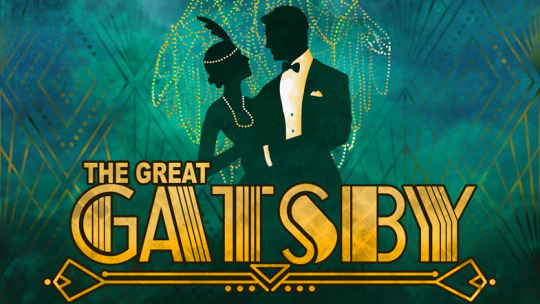
How is that an unreliable narrator? The narrator has their own set of bias and moral standards which function as lenses through which they see the world.
Another way of putting it would be the way teenage romances are often written in a first person narrative where either of the two teenagers is the narrator, so the author can sell to us something as simple as offering a pack of gum as the most romantic act on earth. We're perceiving interactions through rose tainted glasses.
In this case, we're seeing the interactions through Judge Kim's eyes who doesn't trust Judge Kang from the get go due to his own preset bias.
The narrative becomes even more unreliable as we're not exactly sure if what Judge Kang disclosed himself is a fact.
The reason why I love this narrative is because it leaves a lot of space to make simple plot twists to a narrative and make them seem grand, and can elongate a story without making it obvious.
The reason why I hate it is because sometimes, in tv shows mostly, we as viewers can see the other side of the story and grow increasingly frustrated with the main character's prejudice and misunderstandings (I'm looking at you my beloved Beyond Evil).
Also, because I have to wait for a long time before I actually have a clear picture of it.
#kdrama#kdramas#kdrama recommendations#analysis#rant#the devil judge#got7#park jinyoung#ji sung#kdrama meta#kdrama quotes#kdrama analysis#meta#the great gatsby#kim min jung#please dont let this flop
98 notes
·
View notes